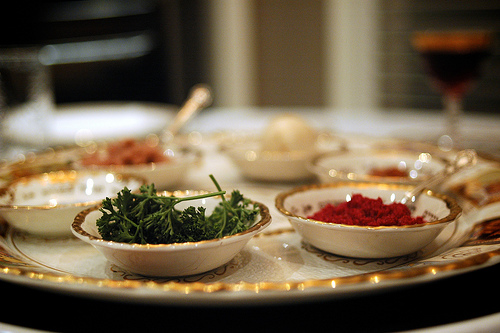The Lilith Blog 1 of 2
March 29, 2013 by Amy Stone
Stuttgart seder – where no Jewish feminist has gone before?

Prologue: Back in New York, the Stuttgart synagogue demands proof of our Judaism before admitting us to the seder given by the Jewish Religious Community of Württenberg (the part of Southwest Germany where Stuttgart is located).
They’re expecting an overflow and Jews get priority. Having to prove you’re Jewish in Germany? As one no-nonsense D.C. rabbi put it, “I’ve had to vouch for the Judaism of people making aliyah, but Germany?” I email a photo of our ketubah. All these years I’d been feeling guilty that I’d sold out and had two male witnesses rather than one female and one male sign our marriage contract. Now bowing to the Orthodox authorities has paid off.
Main event: Problems evaporate. All four of us are admitted to the Stuttgart Jewish community seder – my beloved and I, our raised-Catholic hostess, Christie, and 17-year-old son, Oskar. No security guards. No passport check. About 100 of the faithful are seated at long tables with the Orthodox rabbi at head table, rebbetzin at side. He’s in a kittel (white cloth robe), long white beard, black yarmulke over receding hairline. Christie, a former television newscaster, goes to shake his hand. He recoils. Welcome to someone else’s Judaism.
We get lucky. We end up with a bunch of what looks like Israeli hippies. Turns out they’re The Voca People. Oskar is impressed. We’re clueless. In performance, they’re a singing group of eight, dressed like something between all-white Smurfs and George Segal plaster-of-Paris sculptures with red lipstick. More than 12 million people have already clicked on their website. They’re all about how music needs no translation.
Back at the seder, forget Miriam’s Cup. I have no idea whether or not Miriam plays a role in the Israeli Jewish National Fund (JNF) edition of the parting of the Red Sea.
Who knows what the JNF English version of the hagaddah says. JNF haggadahs are supplied in Hebrew-German and Hebrew-Russian. Most of the crowd is Russian-speaking, but there’s no help to those in need. The Tbilisi woman in maroon hair and amber beads next to us doesn’t even realize there are piles of Hebrew-Russian haggadahs. And forget the Hebrew. Our rabbi’s Hebrew is so heavily Yiddish accented that the Israelis can barely understand him. So much for telling the tale anew for each generation.
This is seder speed-reading, a mostly rabbinic one-man show. Something I last experienced with my grandfather’s whipping through the Maxwell House hagaddah. Not a participatory experience. Is the German translation meaningful for Christie and Oskar? Barely. It’s archaic German. Their first seder remains cloaked in mystery.
The Voca People are smart enough to depart after dinner. We stay the course.
The rebetzin had told me the area has a Jewish community of some 3,000 members. All are welcome, so I feel a copy of Lilith might be welcome.
After the four-and-a-half-hour seder with roast chicken and shmura matzoh, I present the rebbetzin with a copy of the coveted Lilith swimsuit issue – the story of the young Jewish Viennese women swimmers who refused to compete in the Berlin 1936 Olympics. To give an elderly Orthodox woman in sheitl a magazine with 1930s cover photo of a young beauty in body-hugging swimsuit may be a mistake.
Epilogue: Post seder, checking the website of the Jewish Community of Württenberg, I find a link to unorthodox@irgw.de.
Yes, a liberal spinoff exists in the region. Women and men pray together. Women may wear tallises and yarmulkas. Services include German and Russian. They’re building on the liberal Jewish movement started in Germany in 1801, dedicated to the idea that people should understand what they’re saying and women should not be stuck behind a mechitza.
Next year in unorthodox Stuttgart?
photo credit: Dara Skolnick via photopin cc
 Please wait...
Please wait...